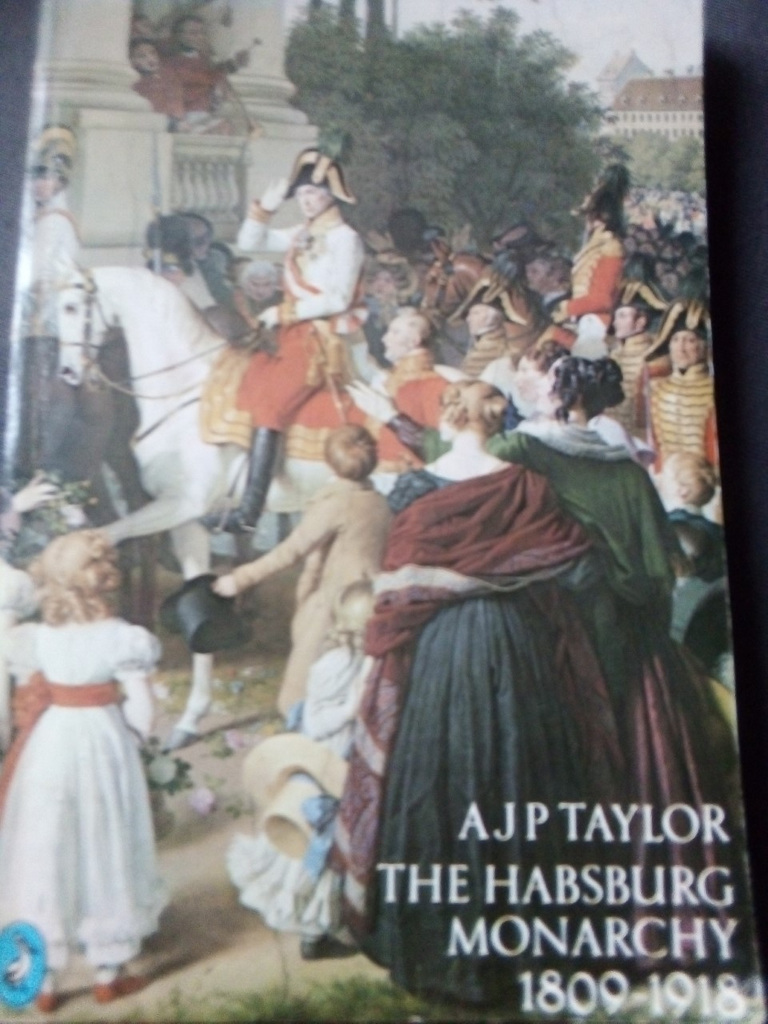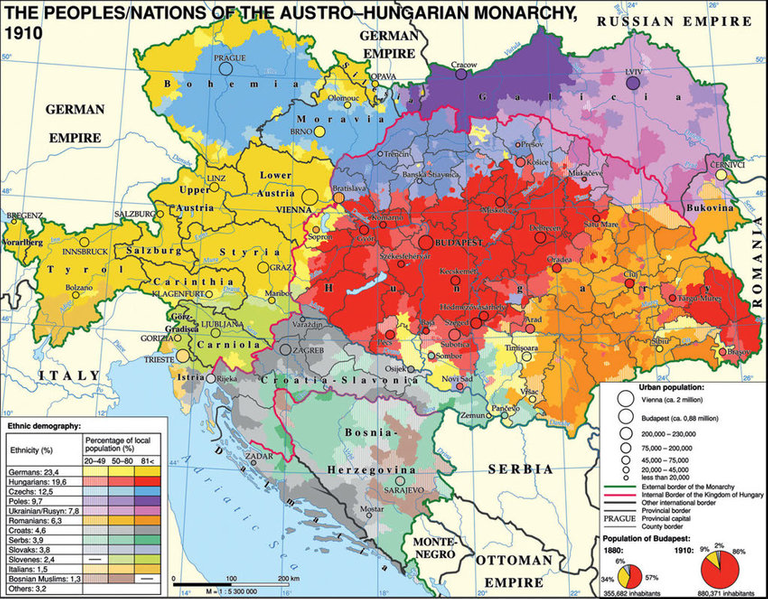Good day Hivers and Book-clubbers,

It's been four full months since I've picked up the virtual pen to write a review. In that time, I've been quite busy with work and other parts of offline-life, which of course deserves priority. Yet I've also been reading quite a lot meanwhile, the vast majority of it non-fiction, as per usual for me. It's been a mix of history, politics, philosophy and theology of all kinds and places.
As for the last two topics mentioned, I feel wholly unequipped to talk about them in any authoritative way. If one struggles with the subject-matter himself, he probably won't be able to explain it to others either. Today's book, however, delves into history and politics, two subjects that I can reasonably have my own say on. And I do love this book as well; as a matter of fact, I've read it three times over the past few years.
The book is titled 'The Habsburg Monarchy; 1809-1914' by historian A.J.P. Taylor (1906-1990). Originally written in 1948, it was revised with additions several times, with my copy being from 1981, which I picked up second-hand. The story proper is told in about 260 pages, but the amount of ground covered in that is impressive.
Habsburg on the Back Foot
The Habsbug dynasty might be the most important and powerful dynasty Europe has ever seen. Starting out as minor nobles in Switserland in the 13th century, they soon started acquiring lands in the Holy Roman Empire, and through a compromise between more powerful lords, became the Emperors themselves. From there on, the Habsburgs made use of tactical marriage alliances to expand their dominions to unheard-of size. Soon, the entirety of Spain, the Netherlands, parts of France, Bohemia, Hungary and Austria proper were theirs. Under Charles V, they started to acquire colonies in the Americas as well, making theirs a globe-spanning empire.
Yet setbacks were bound to happen at some point: the Turks pushed on their south-eastern front from the 15th century onwards, and with the destruction of the Eastern Roman (or Byzantine) Empire and the conquest of Constantinople in 1453, they were on the Habsburg's doorstep. They would take a big part of Hungary following the battle of Mohacs in 1526, and the Habsburgs also considered these lands theirs.
The Dutch Revolt, or Eighty Years War, cut loose the Netherlands from the Habsburg domains. The Protestant Reformation would shake the Holy Roman Empire to its core, though the Habsburgs remained Catholic themselves. The Spanish branch of the family would die off, and Spain and its colonies were lost. France would never become part of the Habsburg domains, and they would surpass the Austrians under Napoleon Bonaparte, who rode the wave of the French Revolution with fire and sword throughout Europe.
This is why the starting date of the book is 1809; the year that Napoleon, Emperor of France in his own right, would not allow another Emperor to exist on the European mainland. So he ended the Holy Roman Empire, which had been in Habsburg hands for almost five centuries, with very few interruptions.

(Taken from here)
This left the Habsburgs with sovereignty of the Danube Monarchy, shown above.
Revolutions and Nationalisms
The Habsburgs themselves, in the 19th century, became an old form of power in a world that was starting to change very quickly. The Enlightenment and French Revolution brought two things to Europe: liberalism and our modern conception of the nation-state.
Both of these things were antithetical to the Habsburgs. Liberalism in those days often meant republicanism, or at least the reduction of a monarch's powers to that of a constitutional monarchy. There was no constitution of any kind in Austria; the Habsburgs ruled as they saw fit.
Nationalism was, ultimately, what would kill the Danube Monarchy. It was the main cause of unrest within its borders. There were twelve distinct peoples within the realm:
-Germans
-Hungarians
-Czechs
-Slovaks
-Poles
-Ruthenes (later: Ukrainians)
-Romanians
-Italians
-Serbs
-Croats
-Slovenes
-Jews
How to make this work? And the truth is, they did not. The most powerful group was the Germans, by quite a margin. The language used in government and administration was German. The upper class and bourgeoisie in the towns were German, or at least German speaking members of other elites.
The most troublesome group were clearly the Hungarians. A people with its own kingdom since the year 1000, the Habsburgs had to be crowned as King of Hungary separately, and left the Hungarians to rule themselves internally. These were privileges that other peoples within the empire did not have, and this led to a lot of friction. Yet the Hungarians themselves were not happy with what they DID have either.
Austria was not doing well in geopolitics either. The loss of the Holy Roman Empire left an important question: what was to become of Germany, and who was to lead it? This used to be a no-brainer: the Habsburgs had a monopoly on the leading position. In the 19th century, however, another kingdom made the power-grab: Prussia. Militaristic, comprising of one people (barring some Jews and second-class Poles as an afterthought), and with the wind at their backs, they would be able to slowly but surely secure all of Germany for themselves. In 1866, they beat the Habsburgs in a war that sealed Austria's fate: to be excluded from the German Empire that was formed in 1870.
Yet this did not mean that the Austrians did not acquire any new land, either. As the map above points out, they annexed Bosnia and Hercegovina in 1878, because Turkish weakness was even more pronounced than that of the Austrians in the late 19th century. This did not do the Habsbugs any good; a complex puzzle became even more jumbled with the addition of Bosniak Muslims and a small upper class of Turkish landholders.
I'll stretch this review into a two-parter, which will delve more into the later years and its leading people, emperors and prime-ministers. I'll see you all then, and I hope you've enjoyed this introduction at least. Until the next one,
-Pieter Nijmeijer
(Top image: photo of book cover)
Congratulations @pieternijmeijer! You have completed the following achievement on the Hive blockchain and have been rewarded with new badge(s):
Your next target is to reach 100 posts.
You can view your badges on your board and compare yourself to others in the Ranking
If you no longer want to receive notifications, reply to this comment with the word
STOPTo support your work, I also upvoted your post!
Check out the last post from @hivebuzz:
Support the HiveBuzz project. Vote for our proposal!
Hope everything is good on your side. I am pretty sure the community miss your non-fiction reviews too. You always present us with interesting books and since it seems you read more during your offline time, I personally can't wait for more of your recommendations.
Thanks for the welcome. I'll try to make up for lost time ;)